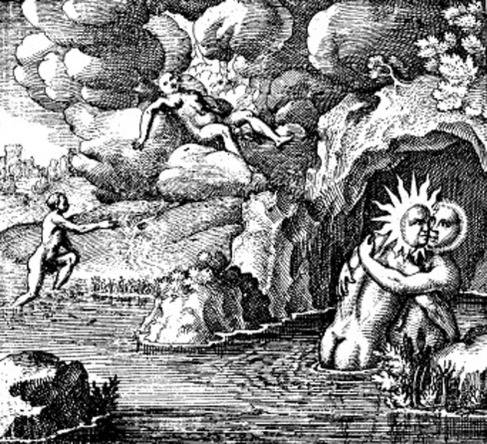Tags
The Wind carried him in his belly
He is conceived in Baths, born in the Air, and being made Red
he walks upon the Waters.
Nature teaches Nature to vanquish fire
Luna is as requisite to Sol as a Hen is to a Cock
Take the egg and strike it with a fiery sword
The Black and White Uroboros eats its tail
Make of the man and woman a Circle, of that a Quadrangle, of this a Triangle, of the ſame a Circle and you will have the Stone of the Philoſophers
Maier was born in Rendsburg, Holstein, in 1568. He studied philosophy and medicine at Rostock (1587), Frankfurt (Oder) (M.A. 1592), and Padua. He attained in 1596 a doctorate in medicine at Basel, and returned to Rostock to practice the medical profession. He also briefly (c. 1601) practised in Königsberg and Danzig. Around this time he became interested in alchemy. In 1608 he went to Prague, and in 1609 became the physician and imperial counsellor of Rudolf II. The interest of the emperor in the occult was the reason of his high esteem for Maier. Maier wrote a commentary on Hermes Trismegistus and was dedicated, along with the emperor, to researching the secrets of nature.
Between 1611 and 1616, Maier spent time in England at the court of James I, and also served other German princes, particularly the prince of Nassau, a great protector of alchemy. His Atalanta fugiens, an alchemical emblem book, was published in 1617; alongside images, poems, and discussion, it included fifty pieces of music in the form of fugues, the form itself being a pun on Atalanta “fleeing”.
Maier nació en Rendsburg, Holstein, en 1568. Estudió filosofía y medicina en Rostock (1587), Fráncfort del Óder (M.A. 1592), y Padua. Logró en 1596 un doctorado en medicina, en Basilea, y volvió a Rostock para practicar la profesión médica. También trabajó brevemente en Kaliningrado y Gdansk. Durante este periodo de tiempo empezó a interesarse por la alquimia. En 1608 marchó a Praga, y en 1609 llegó a ser médico y consejero imperial de Rodolfo II. El interés del emperador por lo oculto fue la razón de su alta estima por Maier. Maier escribió un comentario sobre Hermes Trismegisto y fue dedicado, con el emperador, a investigar los secretos de la naturaleza. Su Fuga de Atalanta (Atalanta fugiens), libro emblemático sobre alquimia, fue publicado en 1617; junto a imágenes, poémas y discusión incluyó cincuenta piezas de música. Devoto Luterano toda su vida, Michael Maier tuvo una fuerte influencia en Isaac Newton. También estuvo involucrado en el movimiento rosacruz, que hacía acto de aparición por dicha época.








Reblogged this on Ouroboric Smallbones.
Wonderful!